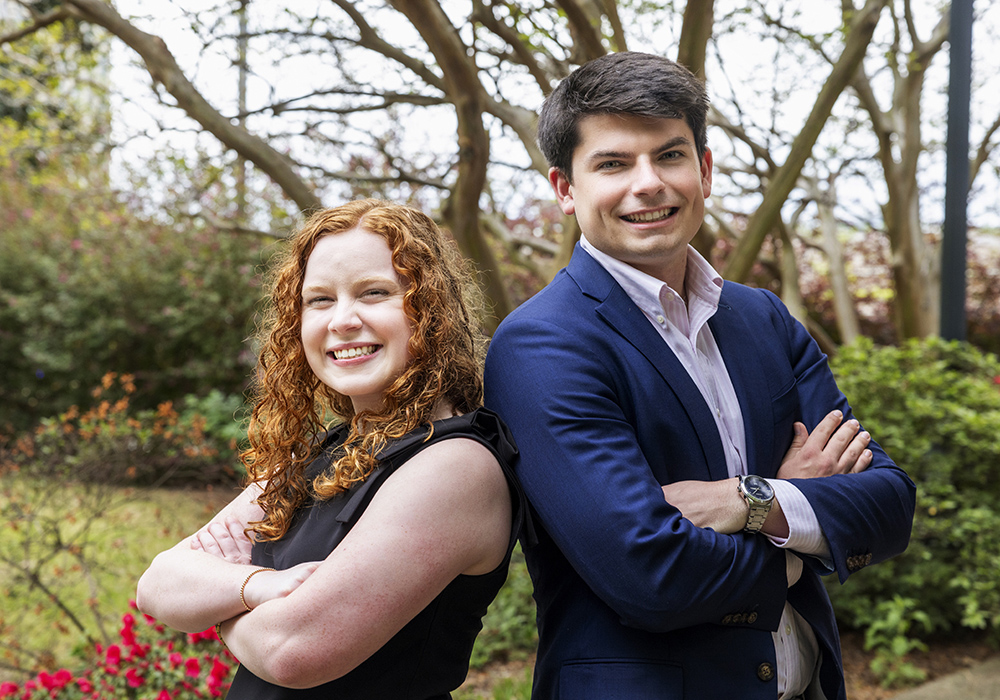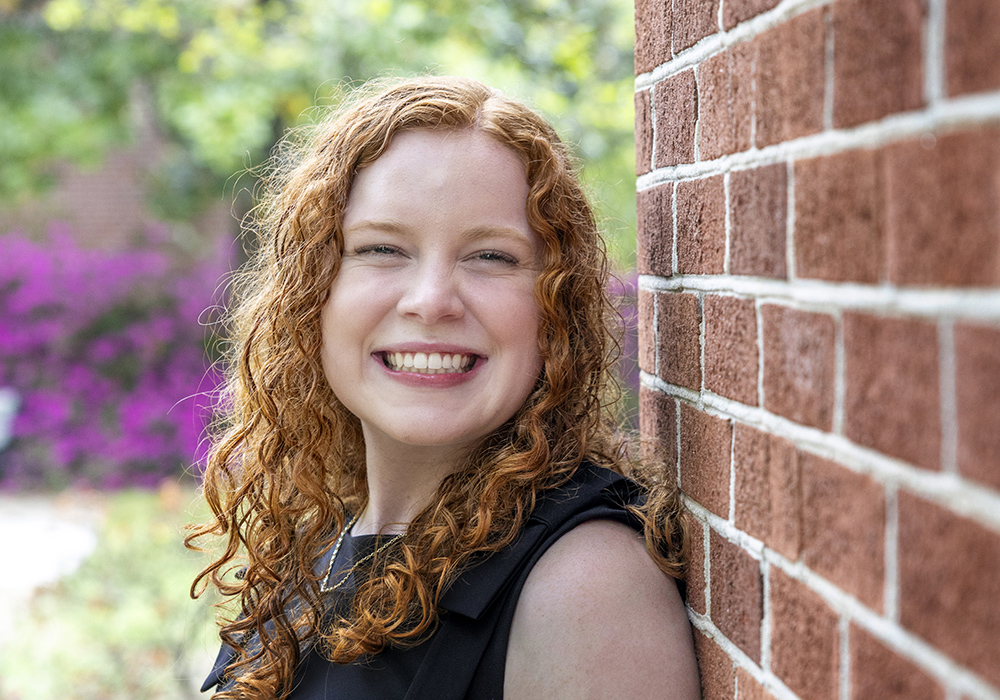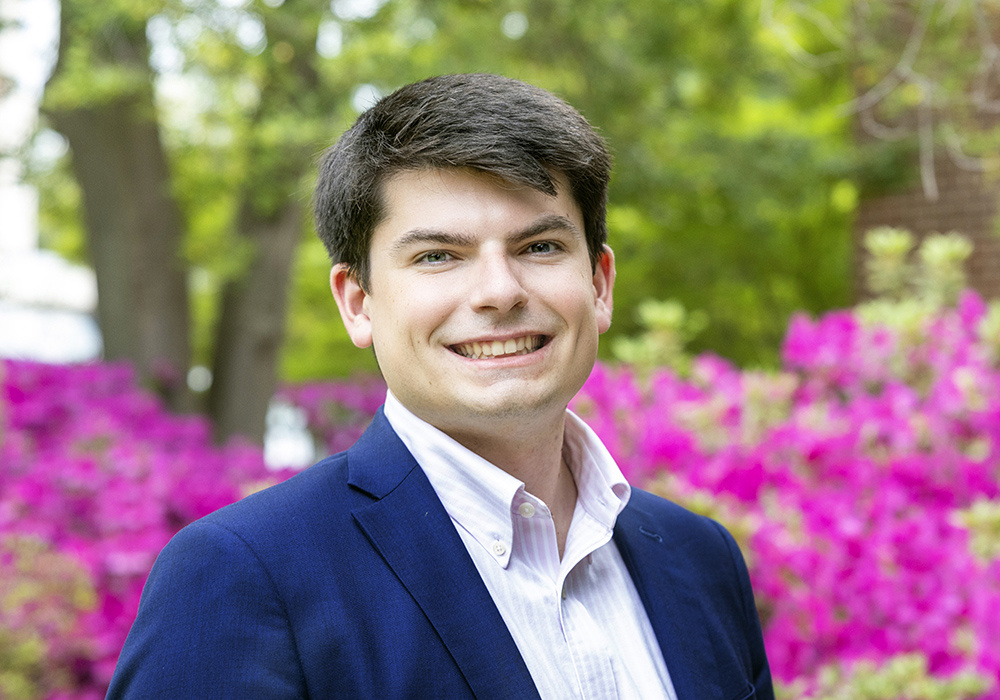At the University of South Carolina, future lawyers, judges and politicians can gain valuable experience by participating in student government. With three branches of government, spirited elections and advocacy groups, students practice skills that will be essential to their careers. Many alumni have found that student government opened the door to incredible opportunities.
Case in point: This year’s student government has two graduating seniors who have been accepted to Harvard Law School, one of the top law programs in the nation. The students credit their time serving in student government at USC, along with the excellent training they received both in the classroom and beyond, with helping them identify their direction in the field of law.
Emily Rabon always wanted to become a lawyer. She grew up watching the movie Legally Blonde, in which the main character attends Harvard Law School. As Hollywood knows, there’s just something about the idea of getting into Harvard.
That idea stayed with Rabon all through her time at USC. A history and political science major from Aynor, South Carolina, Rabon chose USC because she knew the South Carolina Honors College would provide her with the rigorous academic experience she needed to go to any school she chose for her graduate degree.
“I definitely kept my options open when it came to law school,” she says. “But I always knew in the back of my mind that Harvard was the one.”
As she studied for the Law School Admissions Test (LSAT), she kept a brochure for Harvard Law in her desk to pull out whenever she needed inspiration. She says it wasn’t just the school’s prestige that attracted her.
“It’s not about a ranking,” she says. “For years, I’ve looked up to judges, justices on the Supreme Court and legal scholars who attended Harvard. I knew that if I attend this school, I will get so many opportunities to get to know these scholars and to develop as a law student.”
Rabon plans to study constitutional law with the goal of clerking for the U.S. Supreme Court. She’s been working toward this goal for years. Rabon has held an internship or page position with the state or federal government nearly every semester she’s been at USC, including a position with a federal circuit judge.
“One of the reasons I came to USC is because it is in the capital city. I came in knowing I was going to get involved in government in some way,” she says.
Also key to her success are the opportunities USC gave her to participate in fellowships, which brought her to Washington, D.C., to learn with leading professionals and scholars.
“The fellowships I did between my sophomore and junior year were weeks that changed my life. It was a transformational experience,” she says.
After completing her law degree, Rabon aims to become a civil liberties attorney and advocate for clients in the courtroom. Advocacy was a big part of her experience with student government at USC. Rabon started out as press secretary for the student body president. Her junior year, she served as the director of USC’s Congressional Advisory Board, a committee that brings USC student concerns before federal policy makers.
That spring, she participated in the Honors College’s Washington Semester program, which allowed her to move to D.C. to work and study. While there, she helped to coordinate the committee’s trip to Capitol Hill, where they met with officials from nine federal offices to present on the needs of USC students.
“Being in D.C. and advocating on behalf of students with this amazing committee truly lit a flame inside of me,” she says. “I knew I did not want that to be the end of my advocacy journey.”
For her senior year, Rabon was student government’s secretary of Government Relations. In this role, she oversaw advocacy efforts for USC students at local, state and federal levels.
Senior Joseph Buchmaier is also going to Harvard Law. Like Rabon, he has extensive experience with USC’s student government, starting with his time as a student senator his freshman year. He went on to join the Constitutional Council – student government’s judicial branch – and was nominated for chief justice at the end of his sophomore year.
“We hear cases and review the constitutionality of new bills. As chief justice, I was the one who updated the codes and constitution for USC’s student government. You can learn a lot from that,” Buchmaier says. “But personally, I feel like the better training was in learning how to work with people.”
His goal in attending law school is to have flexibility for his future career, and he says that makes Harvard Law the right choice for him.
“You can do a lot with a law degree. You can go into business, work in investment, practice litigation or transactional law,” he says. “I want to make sure I’m putting myself in the best spot to do anything in the future, and Harvard is a great opportunity for that.”
Flexibility has always been a priority for Buchmaier. He entered college with enough credits that he could have graduated early with a bachelor’s in economics from the College of Arts and Sciences. But as a recipient of numerous scholarships and fellowships, he didn’t want to waste the opportunity to expand his education.
“At USC, I was very fortunate to have all this support to get a quality undergraduate education. It was a gift given to me, and I always felt like it would be wrong not to take that and make the most of it,” he says.
Buchmaier added two more degrees, completing a Bachelor of Science in mathematics as well as a Bachelor of Arts in Classics: Latin. He also interned at the Electric Cooperative of South Carolina in Cayce and joined the Open Research Group, Inc., which was co-founded by USC associate professor Jason DeBacker. Buchmaier stresses that it takes more than just a good GPA and LSAT score to get into a top law school.
“You have to find your story,” he says. “What makes you a unique applicant? That’s where your extracurriculars come in: things like student government, internships and clubs.”
Rabon also says that getting into law school requires students to go above and beyond, which is something she and Buchmaier have in common.
“Many of us want to go to class and excel in the classroom, but we also want to go beyond the classroom and get practical experience,” Rabon says. “We want to speak up for others and make a change in society. Joseph and I both did that through student government.”
For Buchmaier, who grew up in West Columbia, South Carolina, going to Harvard represents a chance to get outside of his comfort zone and his hometown for the first time.
“I want to challenge myself in new ways,” he says. “On an academic level, you can be challenged as much as you aim to be at USC, but for me there’s a certain aspect of moving on and seeing new things – just the external challenge of it.”
With a solid foundation from their experience as Gamecocks, Buchmaier and Rabon both feel ready to take on the next challenge.
“At USC, there are people whose job is to help students pursue their wildest dreams. They helped me make the most of every opportunity I was given,” Rabon says. “USC has so many resources to support students, and so the sky’s the limit for what people can do.”


